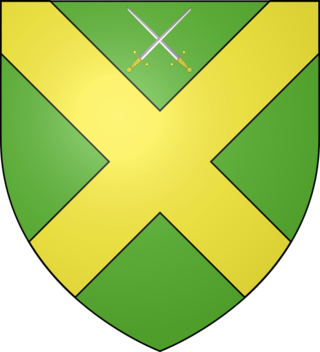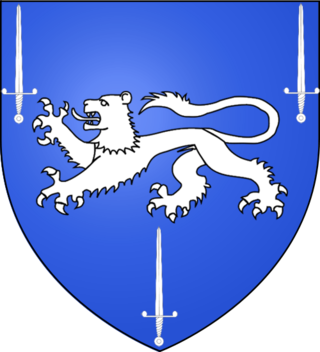Related Research Articles
Dubhaltach Mac Fhirbhisigh, also known as Dubhaltach Óg mac Giolla Íosa Mór mac Dubhaltach Mór Mac Fhirbhisigh, Duald Mac Firbis, Dudly Ferbisie, and Dualdus Firbissius was an Irish scribe, translator, historian and genealogist. He was one of the last traditionally trained Irish Gaelic scholars, and was a member of the Clan MacFhirbhisigh, a leading family of northern Connacht. His best-known work is the Leabhar na nGenealach, which was published in 2004 as The Great Book of Irish Genealogies, by Éamonn de Búrca, more than 300 years after it had been written.

Mícheál Ó Cléirigh, sometimes known as Michael O'Clery, was an Irish chronicler, scribe and antiquary and chief author of the Annals of the Four Masters, assisted by Cú Choigcríche Ó Cléirigh, Fearfeasa Ó Maol Chonaire, and Peregrinus Ó Duibhgeannain. He was a member of the O'Cleric Bardic family and compiled with others the Annála Ríoghachta Éireann at Bundrowse in County Leitrim on 10 August 1636. He also wrote the Martyrology of Donegal in the 17th century.

O'Dowd is an Irish Gaelic clan based most prominently in what is today County Mayo and County Sligo. The clan name originated in the 9th century as a derivative of its founder Dubda mac Connmhach. They descend in the paternal line from the Connachta's Uí Fiachrach. The immediate progenitors of the O'Dowd were Kings of Connacht during the 7th and 8th centuries in the form of Dúnchad Muirisci, Indrechtach mac Dúnchado, Ailill Medraige mac Indrechtaig and Donn Cothaid mac Cathail, before losing ground to their rivals the Uí Briúin.
Brian Luighneach Ua Conchobhair was a Prince of Connacht.
The contention of the bards was a literary controversy of early 17th century Gaelic Ireland, lasting from 1616 to 1624, probably peaking in 1617. The principal bardic poets of the country wrote polemical verses against each other and in support of their respective patrons.

Dunne is an Irish surname, derived from the Irish Ó Duinn and Ó Doinn, meaning "dark" or "brown." The name Dunne in Ireland is derived from the Ó Duinn and the Ó Doinn Gaelic septs who were based in County Laois, County Meath and County Wicklow. These septs in turn are descendants of the O'Regan noble family. It is in these counties that the majority of descendants can still be found. Hundreds of years ago, the Gaelic name used by the Dunn family in Ireland was Ó Duinn or Ó Doinn. Both Gaelic names are derived from the Gaelic word donn, which means "brown". Ó Doinn is the genitive case of donn. First found in county Meath, where they held a family seat from very ancient times. Variations: Dunn, Dunne, Dun, Duen, O'Dunne, O'Doyne, Doine, Doin, O'Dunn.
Tadhg Óg Ó Cianáin (IPA://) was an Irish writer.

Marsh's Library, situated in St. Patrick's Close, adjacent to St. Patrick's Cathedral, Dublin, Ireland is a well-preserved library of the late Renaissance and early Enlightenment. When it opened to the public in 1707 it was the first public library in Ireland. It was built to the order of Archbishop Narcissus Marsh and has a collection of over 25,000 books and 300 manuscripts.

The Book of Lismore, also known as the Book of Mac Carthaigh Riabhach, is a late fifteenth-century Gaelic manuscript that was created at Kilbrittain in County Cork, Ireland, for Fínghean Mac Carthaigh, Lord of Carbery (1478–1505). Defective at beginning and end, 198 leaves survive today, containing a miscellany of religious and secular texts written entirely in Irish.
Kenneth W. Nicholls, Irish academic and historian, is an Irish historian, notable for his work on the late medieval and early modern period; he was the subject of a festschrift in 2014.
Cú Choigcríche Ó Cléirigh was an Irish historian and genealogist, known in English as Peregrine O'Clery.

MacGorman, also known as McGorman, Gorman, or O'Gorman, is an Irish Gaelic clan based most prominently in what is today County Clare. The paternal ancestors of the clan are of the Laigin and emerged in what is today County Waterford. As leaders of the Uí Bairrche, they competed with the Uí Cheinnselaig in the 5th century for the Kingship of Leinster, ultimately losing out in that specific arena, but holding on to significant lands in the Leinster area.
Sir Robert Doyne (1651–1733) was an Irish barrister and politician.
Tadhg Dall Ó hUiginn was an Irish poet.
Cormac Mac Cárthaigh was a Gaelic Irish ruler who was King of Munster. A member of the Mac Cárthaigh clan of the Eóganacht Chaisil, he was the final king of the unified Kingdom of Munster before the realm was divided into the Kingdom of Desmond and Kingdom of Thomond in the aftermath of the Treaty of Glanmire.
Tadg Óg Ó hUiginn was an Irish poet.
Ó Cianáin was the name of a Gaelic-Irish Brehon family. They were originally erenaghs of the parish of Cleenish, Lough Erne, but who had served for several centuries as historians to Mag Uidir of Fear Manach.

The Kingdom of West Breifne or Breifne O'Rourke was a historic kingdom of Ireland that existed from 1256 to 1605, located in the area that is now County Leitrim. It took its present boundaries in 1583 when West Breifne was shired and renamed Leitrim, after the village of Leitrim, which was an O'Rourke stronghold. The kingdom came into existence after a battle between the ruling O'Rourke clan and the ascendant O'Reillys caused the breakup of the older Kingdom of Breifne and led to the formation of East Breifne and West Breifne. The kingdom was ruled by the O'Rourke clan and lasted until the early 17th century, when their lands were confiscated by England.
Doyne is a surname. Notable people with the surname include:

Portnahinch or Portnehinch (Irish: Port na hInse is a barony in County Laois, Ireland.
References
- Kenneth Nicholls (1983) The O Doyne (Ó Duinn) Manuscript, Coimisiún Láimhscríbhinní na hÉireann, Dublin.